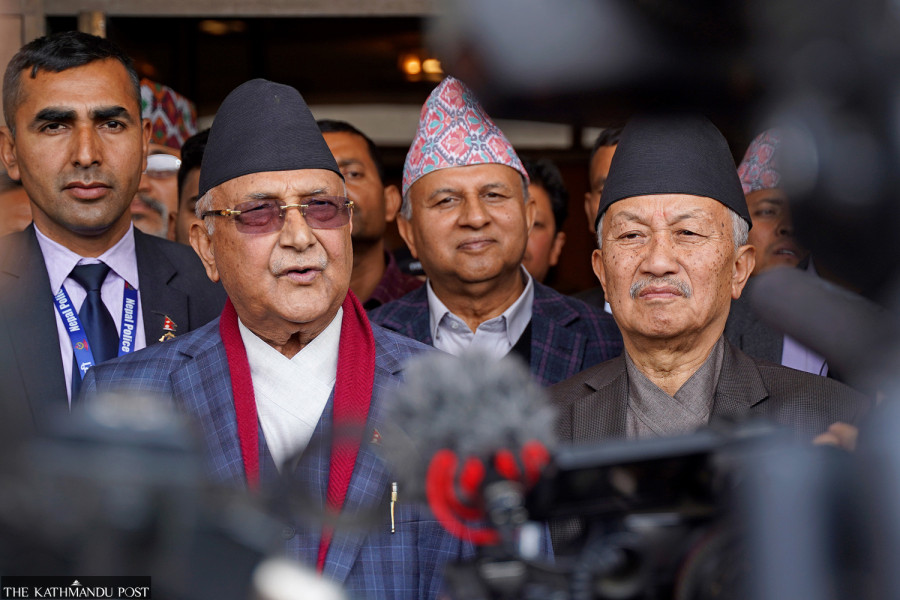Politics
Can Oli pull off another miracle?
The second-largest party is determined to break the eight-party alliance and win the March 9 vote.
Anil Giri
Following the filing of candidacies for the post of the President, the CPN-UML, the second largest party in the parliament, still believes it can turn the presidential election in favour of Subas Nembang, its official candidate for the top post.
Senior Nepali Congress leader Ram Chandra Paudel also filed his candidacy for the head of state on Saturday. Paudel’s candidacy was proposed and seconded by leaders from eight political parties, an alliance formed on Friday evening. Nembang has yet to get the support of any other party besides his own for the March 9 election.
UML leaders hope to use the days before the vote to turn the tide in their favour. “We will try our best to create a rift in the eight-party alliance and install Nembang as the President,” a UML office-bearer told the Post.
As per the December 25 understanding, when Pushpa Kamal Dahal of the CPN (Maoist Centre) became the prime minister with the UML’s backing, a UML nominee would be elected the new President (the ruling coalition had enough votes to ensure that). The UML’s Devraj Ghimire was elected the House Speaker based on the same understanding.
The Congress landed its first blow on the UML-Maoist Centre alliance by giving PM Dahal their confidence vote on January 10. Dahal has been saying that it was now up to him to return the favour to the Congress. For him, this meant finding a presidential candidate acceptable to a broad section of the political parties, including the Congress.
“I am confident that Prachandaji [Dahal] will vote for our candidate,” UML Chairman KP Sharma Oli said after the party’s Secretariat meeting on Saturday. “He told me that he is now under pressure and in a difficult spot.”
Oli dismissed the new alliance as a tea meeting of eight parties at the prime minister’s residence. “We are still in touch with some of them. The December 25 agreement holds and we are confident that our candidate will win,” he said.
In what is believed to be a tactical move, the UML on Saturday did not rescind its support for the Dahal government.
The Rastriya Swatantra Party, the Rastriya Prajatantra Party, the Janata Samajbadi Party and the Nagarik Unmukti Party backed Dahal as prime minister on December 25 as he ditched the Congress-led electoral alliance to become the top executive.
To solicit support for Nembang’s candidacy, the UML has dispatched letters to all the parties in the House except the Congress. “We will resume talks with all the parties in order to break the new coalition. In fact, the process started on Saturday,” said the UML office-bearer.
In a bid to foil the efforts of Dahal and Congress President Sher Bahadur Deuba to form a new alliance, UML chair Oli had also offered CPN (Unified Socialist) chair Madhav Kumar Nepal its support in his own bid to become the new President. But Nepal turned down the offer and joined the Congress-Maoist camp.
Oli wrote to Nepal on Saturday soliciting Unified Socialist’s support for Nembang’s candidacy.
In response, Jagannath Khatiwada, spokesperson for Nepal’s party, said it was too late to join hands with the UML for the upcoming presidential election. The party however thanked Oli as “the letter had formally opened the doors of political dialogue” and it would help create an environment in the future to work together on certain agendas.
The Congress has warned the UML not to fish in murky waters. “We’ll foil all such attempts,” said Prakash Sharan Mahat, the Nepali Congress spokesperson.
“Prachandaji is under pressure from in and outside the country. He told me that he could not resist international pressure,” Oli reportedly told the party meeting. “From the day we formed the seven-party alliance, there were attempts to break it.”
The Rastriya Prajatantra Party quit the government on Saturday and withdrew its support to the Dahal-led government.
Prime Minister Dahal spoke on Saturday of how he had heaved a sigh of relief on Friday, referring to his party’s decision to support the Congress candidate and hinting at a change in the governing alliance.
“Working together with the forces opposed to the republican order in the country was difficult,” Dahal said at an event in Kathmandu on Saturday.
“There are still talks of House dissolution. When I became the prime minister, some forces were trying to tie up with the former king,” said Dahal. “I came to a conclusion that the alliance I was leading was not in favour of the constitution.”
But the UML leaders have openly said they will devise a strategy to divide the new eight-party alliance.
“There was some misunderstanding between us. A lot will change by March 9,” said Prithvi Subba Gurung, a UML deputy general secretary. “The old alliance of seven parties is very much intact. Did the eight-party meeting document anything about creating a new alliance? By March 9, we will rally other parties in our fold against the Nepali Congress presidential candidate.”




 13.12°C Kathmandu
13.12°C Kathmandu














